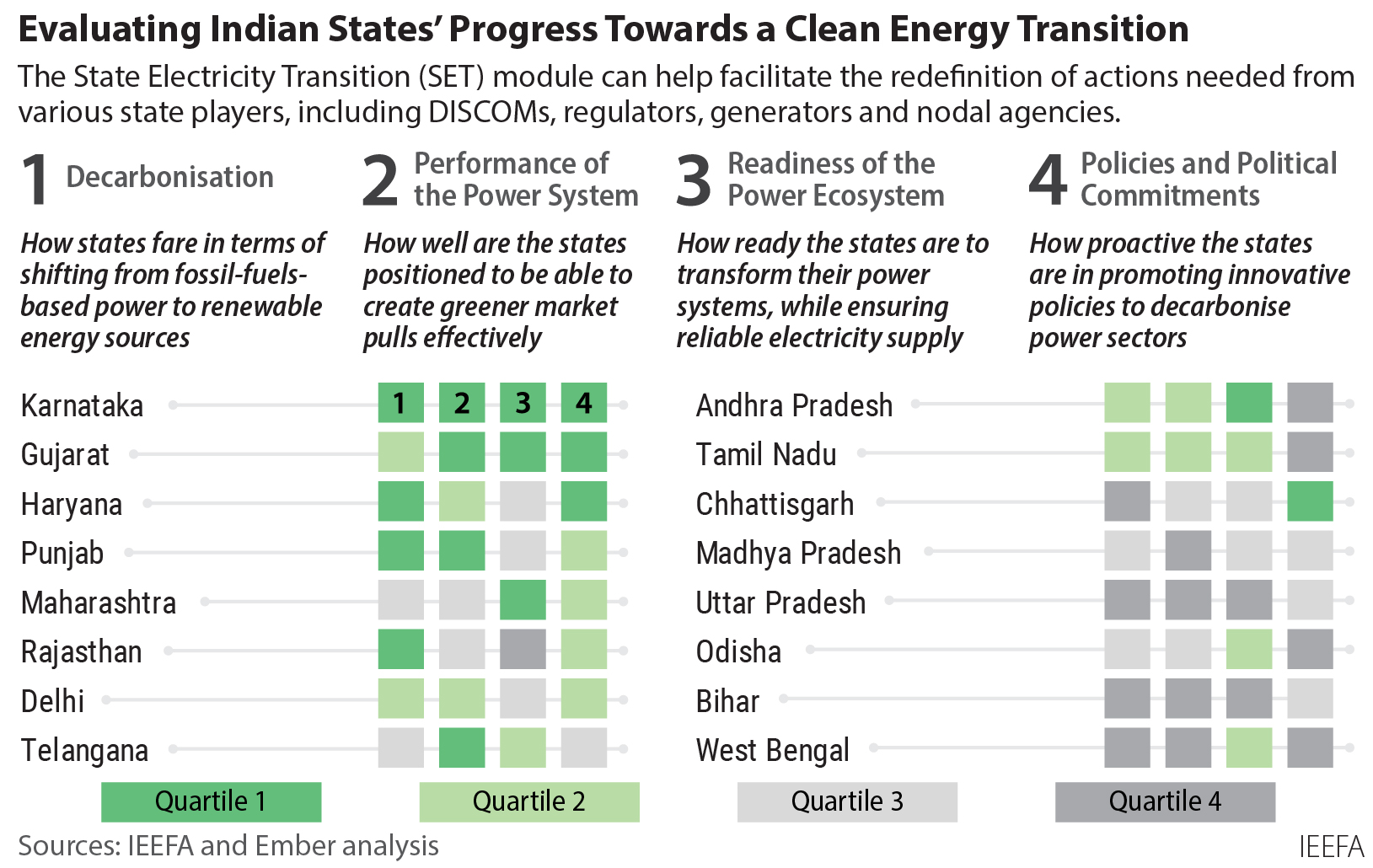[ad_1]
While India’s revised Nationally Determined Contribution (NDC) targets put it on the appropriate path for transitioning its electrical energy sector, it wants the cooperation of its states. We discover that renewable energy-rich states are usually not utilising their renewable power technology potential. To repair this, states must set well-defined renewable power targets. States wealthy with renewable power have the potential to behave as export hubs and assist different states meet their clear power targets. At the identical time, state power departments additionally must strengthen electrical energy infrastructure for higher integration of renewables. States should additionally enhance participation in inexperienced market mechanisms and have extra beneficial insurance policies for a similar. States should additionally enhance information transparency for higher analysis of their progress to take corrective measures. Finally, states should additionally bridge the hole between electrical energy transition coverage intent and implementation.
The international electrical energy economic system is altering quick. Despite the Russian invasion of Ukraine highlighting continued heavy dependence on fossil fuels, the world will add as a lot renewable power within the subsequent 5 years because it did within the earlier 20 years.
India, now with the G20 Presidency, shall be key to the electrical energy transition.
India, now with the G20 Presidency, shall be key to the electrical energy transition. It ranks eighth within the Climate Change Performance Index (CCPA) 2023 and earned excessive scores within the Green House Gases (GHG) Emissions and Energy Use classes, in addition to a medium for Climate Policy and Renewable Energy.
Decarbonisation, decentralisation, and digitisation are extensively considered the three pillars of reaching web zero targets. We discover that whereas India is on the appropriate path with revised Nationally Determined Contributions (NDC) targets, the absence of roadmaps and concrete motion plans hampers it from reaching the targets. In addition, India additionally wants its states’ cooperation and management to attain bold nationwide and state local weather targets.
To assist chart the roadmap and establish the areas that require motion and a spotlight, we devised the States’ Electricity Transition (SET) Scoring system. We analysed 16 Indian states that account for 90% of the nation’s annual energy requirement on 4 key dimensions of electrical energy transition. We recognized and finalised these dimensions via a number of skilled consultations. The dimensions are: 1) Decarbonisation (state’s preparedness to shift away from fossil-based energy), 2) Performance of the ability system (state’s capability to incentivise greener market participation), 3) Readiness of the ability ecosystem (state’s energy system reliability to make sure electrical energy provide for the transition), and 4) Policies and political commitments (state’s insurance policies to push for energy sector decarbonisation).
Key messages:
- Indian states have proven notable clear electrical energy transition efficiency. The efficiency of states like Karnataka, Gujarat, Haryana, and Punjab, which have demonstrated appreciable efforts in general preparedness and dedicated capabilities to advertise clear electrical energy, signifies the progress of Indian states in the direction of a clear electrical energy transition.
Karnataka is the one state that scored effectively throughout all the size of fresh electrical energy transition recognized on this examine. It was the best-performing state in decarbonising its energy sector, the efficiency of its energy system and the readiness of its energy ecosystem. It additionally has conducive insurance policies and political commitments for a smoother transition. Gujarat was slightly behind Karnataka by way of decarbonising its electrical energy sector. Similarly, Haryana and Punjab have proven promising preparations and implementations for electrical energy transition of their respective states.
- States should nonetheless ramp up their efforts to maximise renewable potential. Bihar, Uttar Pradesh, and West Bengal should develop on their potential and transition commitments as they’ve many areas to enhance upon to strengthen their clear electrical energy transition performances.
The three states fared decrease than their counterparts in decarbonising their energy sectors and the efficiency of their energy programs. The energy programs in Bihar and Uttar Pradesh require additional enhancements to help a clear transition. For West Bengal, whereas its energy system confirmed higher efficiency than the opposite two states relating to readiness to transition, a transfer away from a fossil fuel-intensive energy sector requires extra proactive insurance policies and political will.
- Rajasthan and Tamil Nadu have began their clear electrical energy transition, however progress has not been constant throughout all the size. As the long-considered front-runners in constructing new renewables capability, these two states, unsurprisingly, confirmed promising progress in decarbonising their energy programs. Still, they fell quick of their respective energy sectors’ relative efficiency and readiness to transition to wash electrical energy.
We present a snapshot of our SET Score evaluation in Figure 1. The intention of the SET Scores was to not rank states however to analyse their efficiency, acknowledge their efforts and spotlight their challenges.
Figure 1: Macro Performance of 16 States on Electricity Transition Dimensions

Source: IEEFA & Ember Analysis
This evaluation concludes with the next suggestions to speed up the sub-national electrical energy transition. A snapshot of the suggestions are:
- Multi-dimensional efforts are wanted to make sure an efficient and sustainable electrical energy transition. Efforts are required to decarbonise the supply-side via extra renewable deployment and revamp the demand aspect via energy-efficient intervention. In addition, strengthening of transmission infrastructure is essential for higher integration of renewables.
- States ought to enhance participation in inexperienced market mechanisms via extra beneficial insurance policies like open entry and banking of energy. Innovative bilateral monetary markets mechanisms like Virtual Power Purchase Agreements (VPPA) and Contracts for Difference (CfD) have enormous potential to open the market.
- State-level information availability and transparency want enchancment to measure and observe progress. The centre and states must coordinate higher to frequently seize state-level information updates on present nationwide portals.
- States ought to guarantee efficient and well timed implementation of fresh electrical energy transition insurance policies like no coal, inexperienced manufacturing, direct profit transfers, inexperienced power open entry and extra.
[adinserter block=”4″]
[ad_2]
Source link